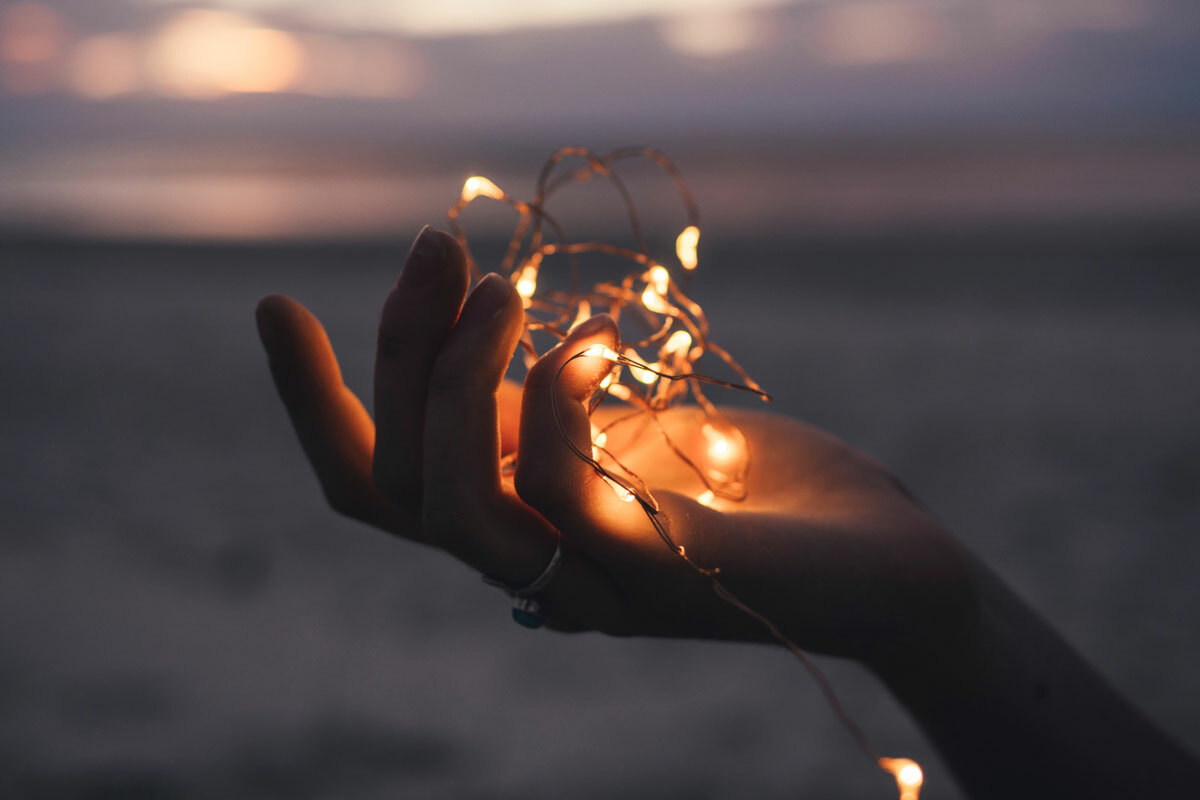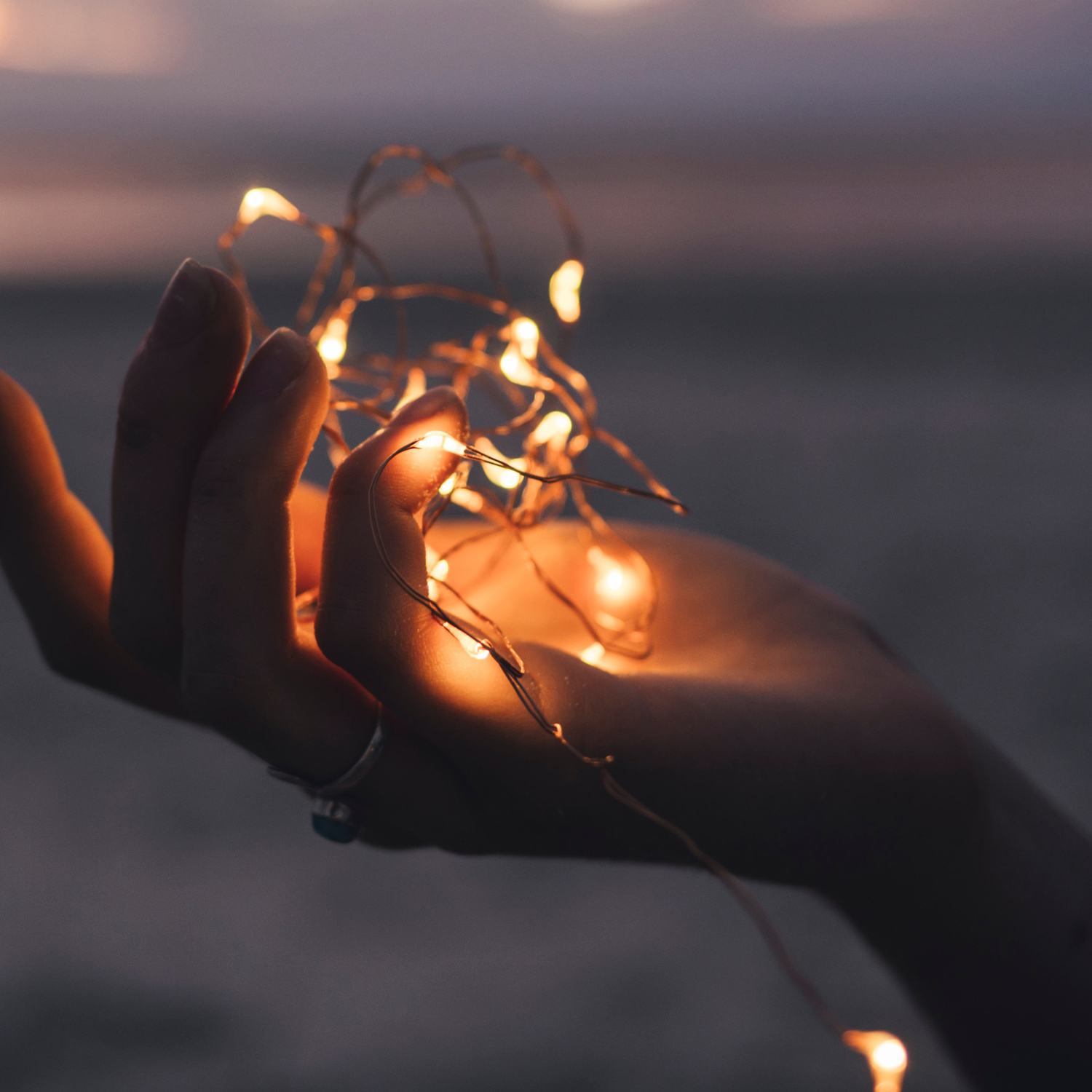
The Word became flesh
and made his home among us.
—John 1:14, CEB
This month the church calendar finds us in Advent, the season of waiting and watching. The season when we celebrate Emmanuel, God with Us. Not God limited to scripture, not God with us through testimony or a pillar of cloud and fire. Not God prophesied. But God with us in the flesh, a human born with lungs and wails and the whimpers of a baby. A human with adolescent proclivities for straying from his parents, and ego enough to sit with the teachers in the synagogue. A human who walked dusty roads, drank from wells, and gathered around the table for meals.
And also the first Word, the Light of the world, the glory of God in flesh. The Human One who used dirt and saliva to give vision, who called his disciples to rest a while, who valued nourishment on the Sabbath more than law and tradition. The Human One who chose the most basic and common elements of bread and wine and imbued them with memory in order that we would be called to live differently each time they are blessed and broken and given. Jesus took seriously his body and the bodies of those he encountered.
Jesus embodied the message that our bodies were created by God as good. Our bodies are integral to our relationship with God, one another, and the world. Bodies are not something to denigrate, judge, or conquer with our minds. They are, in fact, great sources of wisdom and knowledge. Created in order to help us connect to God.
This has been a long and slow realization for me. It came through therapy and the practice of yoga. But I’m getting ahead of myself.
In the first eighteen years of my life, my two greatest influences were the sport of gymnastics and the Protestant church, probably in that order. I started rolling and bending and stretching and challenging my body at the age of three. I tumbled and bounced and contorted … and very early began ignoring the subtle messages of pain and discomfort that my body was sending me. My natural flexibility was stretched to its edges. My tolerance for discomfort was praised and honed. My love for adventure and challenge was channeled into greater difficulty of skills and tricks. And I became very good—at the sport and at bending my body to the will of my mind.
When I was 16, I regularly saw an orthopedic back specialist who refused my request for steroid shots into my spine. The doctor knew that intense pain was the only thing that would limit my practice and competitions. I continued to compete with limited practices until I recognized that the pain was changing me, changing my relationships with my parents, my friends, and affecting my schoolwork. In many ways I felt that I had failed—my body had failed me, and I had failed in finding enough willpower to make it through my senior year.
During those same eighteen years, my family was active in a local Presbyterian Church USA, and later United Methodist Church congregation in Fort Wayne, Indiana. My home was one of radical hospitality—folks coming and going all the time, welcomed, fed, and comforted. We offered this hospitality though we didn’t make space for our own family hurts like alcoholism and financial struggles. I learned by observation how to duck questions about my own emotions and feelings while compassionately turning the conversation to a friend’s current needs and struggles. I became a gifted listener while persistently ignoring and silencing the loneliness, sadness, and anger inside me. I subdued my body’s and spirit’s natural warning systems.
As an adult, I began writing curriculum, devotions, chapters, and books focused on the importance of balancing theological and biblical information with spiritual formation and embodied experiences. I continued this freelance work as our family moved to Malawi, Africa, as volunteers in mission for two years from 2009 to 2011. There we were immersed in an embodied spirituality, a culture where prayer naturally combined clapping, where singing necessitated dancing, where crying was accompanied by beating one’s chest, and where celebrating involved ululating.
When I got back home to the US, things took a traumatic turn for me. I experienced clinical depression for the first time, a malaise and sadness that was paralyzing and frightening. Thankfully, I found a counselor who knew the wisdom of breath and body and led me to see how healing could be found by re-integrating my mind, body, and spirit. At the same time, I found a gifted yogi who began to deprogram 15 years of body memory and training from gymnastics.
In therapy, my counselor would ask me simple questions like, “What do you feel?” and “Where do you feel it (sadness, anger, joy) in your body?” These questions confused me for months. I would ask my counselor to repeat the questions over and over, unable to provide an answer, to find what she was looking for, to know my own feelings and feel with my own body.
So she tried a different tact… After I would tell her about my week she would ask, “When that happened, where did you feel it in your body?” And as I replayed the memory, I would feel my shoulders round and my chest get tight. She said, “That may have been anxiety.” “Really?” I thought. “My body knew my emotions before my mind???” She asked, “What do you do when you get sad or angry? And I couldn’t remember the last time I had cried or been angry. But I knew my jaw hurt from being clenched, and no massages could release the tension in my shoulders.
Slowly, like a toddler learning her colors, I began to name my emotions. And I began to heal the divide I had created within myself.
At the same time, I started going to yoga. In yoga, we breathed deeply, in and out. And I noticed that more often than not my breath was very shallow. I never breathed all the way into my belly or totally filled my lungs. Or even exhaled. In yoga, we stretched our arms wide. And I noticed that I often sat with my shoulders rounded, hands on the keyboard. Or curled up on the couch watching TV. In yoga, we bent over and twisted. And the emotions stored in my body began to move and release.
For months, at the end of each yoga practice, I wept. The tension, worry, anxiety, and sadness began to leave my body. And in the space they left, I felt release and ease and joy.
This experience of healing, of hearing the wisdom of my body, prompted me to look more closely, more deeply at my Christian tradition. This tradition that claims a God who put on flesh, healed with his touch, promised the Spirit as comforter. One who asked his followers to remember him in physical elements of bread and wine.
My prayer practices have changed. I’ve learned the wisdom in taking different postures to connect with our bodies and with God during prayer.
And I can tell you that like any spiritual discipline, the more I practiced what I am learning, the easier these new skills come to me.
My body becomes a prompt for prayer. My body is my teacher and guide. My body was created with a wisdom that complements my rational mind and book learnin’.
In this season when we celebrate Emmanuel, God with Us, remember the one who embodied God’s heart here on earth. Jesus, Emmanuel, who prayed with his whole self. Who taught as he walked. Who released rejection as he shook dust from his feet. Who wept at the death of his friend. Who cast out demons that would threaten person’s bodies and who sweat blood in despair. This Jesus who performed miracles in the face of violence. This body, born in a lowly stable and died on a cross. And yet he breathed into the disciples and to each one of us the breath of God. The God of Love lived in the body of Jesus. And this God of love lives in your body and through your mind, your heart, your spirit.
In these busy days, I invite you to pay attention to your body. Take some time to listen to your body and its wisdom. Listen for when you need to rest, eat, sleep, feel. Listen! What wisdom do you hear?
Kara Lassen Oliver serves as Associate Publisher and Executive Director of Content at The Upper Room.
Photograph by Marcus Wallis / Unsplash
